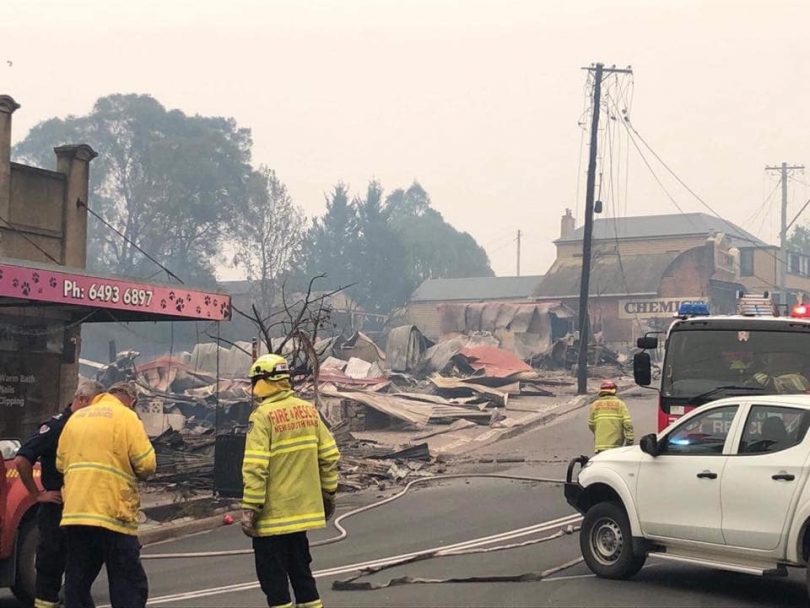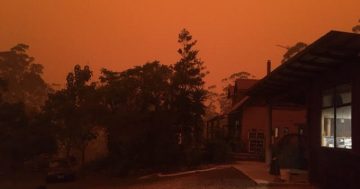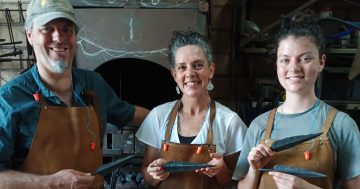
Cobargo’s main street on the morning of 31 December, 2019, after bushfire tore through the town in southeast NSW. Photo: Facebook.
World-leading fire and trauma recovery experts will join a free virtual Community Resilience forum for the NSW South Coast community in Bega next week to support communities and people still grappling with the fallout from the past summer’s bushfires.
The online forum, on Tuesday, 19 May at 8:45 am, will be hosted by a groundbreaking initiative which is aimed at building resilience and hope in rural and regional communities that have been devastated by drought and fire.
Farmers for Climate Action is a group of farmers and rural leaders working to ensure farmers and regional communities are a key part of the solution to climate change.
The forum, which is open to the entire community, will examine at the impact of the catastrophic bushfires on the South Coast, and how the community can develop strength and resources to rebuild and face the challenges of climate change.
It aims to provide attendees with an understanding of the mental impact of disaster on the community, and give the community tools to create change.
Featured speakers include Emergency Leaders for Climate Action chair and former NSW Rural Fire Service Commissioner Greg Mullins, and disaster and trauma recovery expert, clinical psychologist Dr Rob Gordon, who has been working in the field of disaster recovery since Ash Wednesday in 1983.
Mr Mullins, who fought the fires at Batemans Bay on New Year’s Eve as a Rural Fire Service volunteer, will speak about the impact of climate change on the intensity, severity and increasing frequency of bushfires.
He said the local community had shown incredible strength during the tragedy, but that planning for a future involving worsening bushfires was necessary due to the effects of climate change.
“There aren’t many communities in the world that have had to face what the South Coast went through over summer, and prior to that, in Tathra in 2018,” said Mr Mullins. ”We’ve never before seen bushfires on this scale, but they’re going to become a regular occurrence unless we take urgent action to reduce greenhouse emissions. That means everyone has to have a plan for survival.
“During the summer’s fires, the phone towers went, electricity failed and all access was cut off. There was no radio, no internet and no phones so nobody could get emergency warnings. There was no refrigeration, no medication available for people who needed it, and food stocks dwindled.
“Everything can fall over so quickly, and a big part of building resilience is going back to basics and asking yourself whether you have the essentials for survival, whether you can cope on your own if everything ‘normal’ is suddenly gone. Resilience begins at home, in local communities and at all levels of government.”
Farmers for Climate Action CEO Wendy Cohen said the forum sought to bring people together to develop strategies to face the challenges that lie ahead.
“Rural and regional Australians have an extraordinary capacity for coming together and tackling challenges as one,” she said.
“It has been a tough few months of bushfires and social isolation, but we want to bring people together to identify and pursue the solutions that will make communities stronger, more resilient against climate and economic threats, and help alleviate the threat of climate change.”
Ms Cohen was previously CEO of the Country Education Foundation of Australia, where she fought for better education outcomes for rural and regional students. She was also CEO of Equestrian NSW during the 2007 equine influenza crisis, spearheading the response and overseeing the distribution of more than $25 million in relief funds.
Also participating in the forum will be Denis Ginnivan, a grassroots political leader who is the immediate past president and a foundation member of Voices for Indi, a community group based in northeast Victoria which encourages citizens to engage and participate in politics and democracy.
To join the online forum, register your details here.









